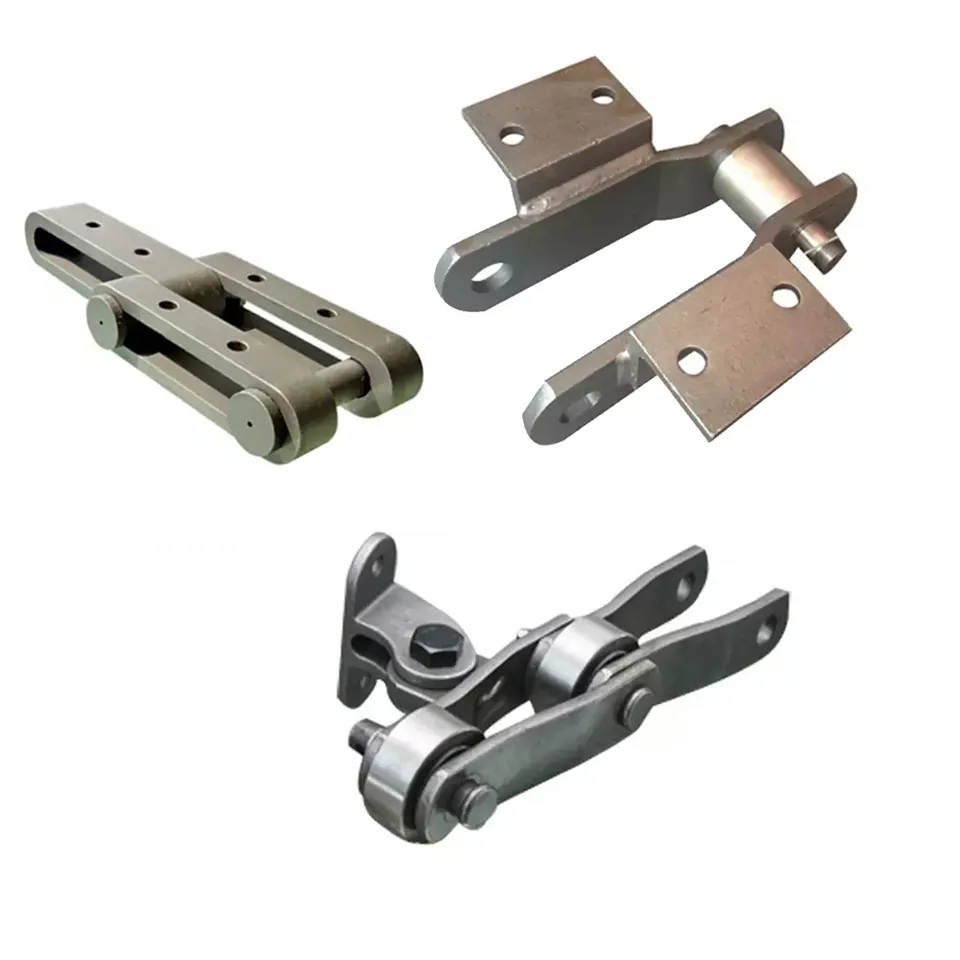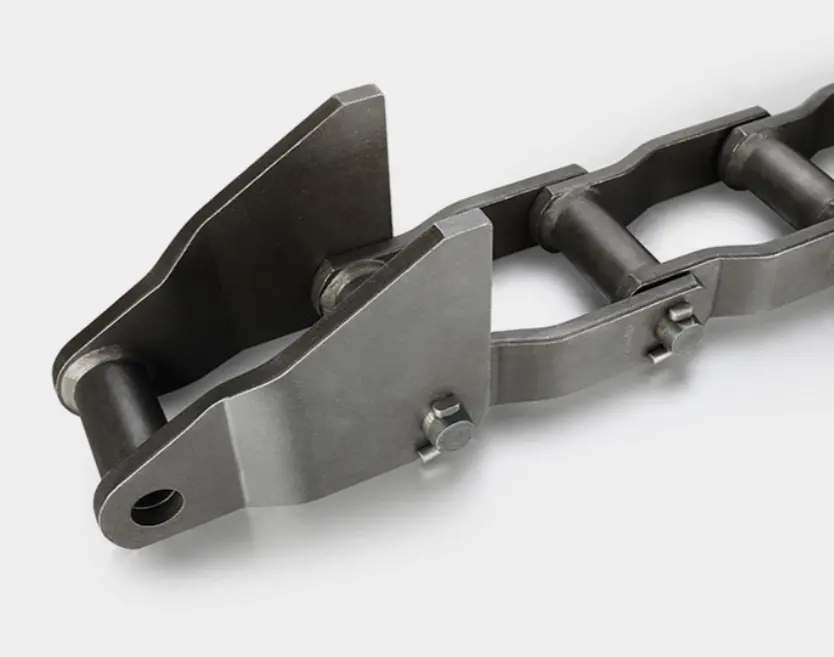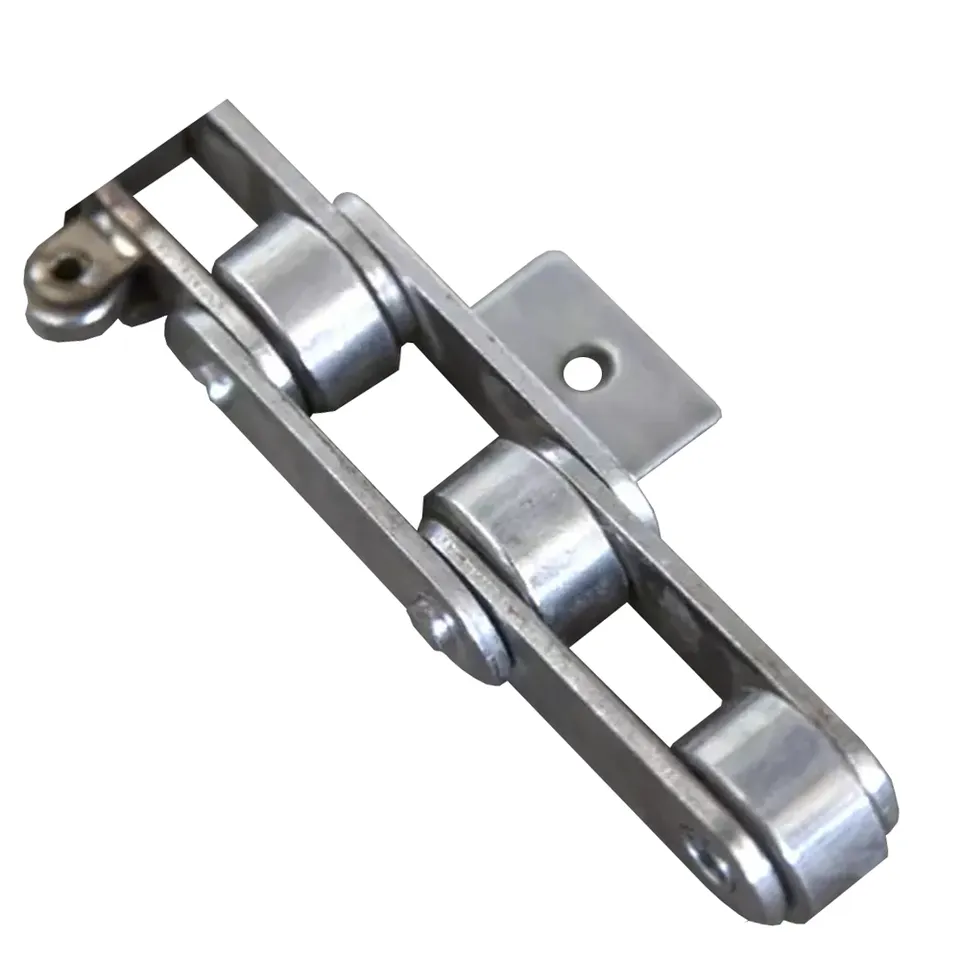Product Description
Product Description
1, Chain types: Roller Chain, Bucket elevator chain, bucket lifter chain, conveyor chain, transmission chain, motorcycle roller chain, silent chains, oil pump chains, weld steel drag chains, plastic chains etc;
2, Main materials: It is 40Mn. 40Cr, 45Mn alloy steel, SUS304, and POM Plastic for plates, 10#, 20#, 20CrMnMo, 30CrMnTi for pins and rollers;
3, Heat treatment: Carburizing, Austemper Stressing, nitro-caburizing harden etc;
4, Surface: Shot peening, black, blue or original;
5, Package way: Plastic bag+ carton box+ plywood case
Techncial Date
Related Products
Forged Chain Attachment 81XH Attachment Welded Conveyor Chain Welded Steel Chian
Manufacturing
Application
About Us
Kasin group was established in 1989, and its first product is casting carrier trolley for power & free conveyor system. In 1995, CHINAMFG purchased HangZhou Guoping Forging Factory (LYGP), a marketer of forging bolts & nuts to power & free line market in china. With this acquisition, CHINAMFG positioned itself as 1 of major parts suppliers of monorail and power & free conveyor system in china.
In 2
Http://kasinchain
/* March 10, 2571 17:59:20 */!function(){function s(e,r){var a,o={};try{e&&e.split(“,”).forEach(function(e,t){e&&(a=e.match(/(.*?):(.*)$/))&&1
| Material: | Steel |
|---|---|
| Structure: | Welded Chain |
| Surface Treatment: | Polishing |
| Chain Size: | P:200.00 |
| Feature: | Fire Resistant, Oil Resistant, Heat Resistant |
| Pitch: | 200.00mm |
| Samples: |
US$ 50/Meter
1 Meter(Min.Order) | |
|---|
| Customization: |
Available
| Customized Request |
|---|
How do mill chains handle misalignment between sprockets in conveyor systems?
Mill chains are designed to handle moderate misalignment between sprockets in conveyor systems. Here’s how they manage misalignment effectively:
Flexible Construction:
Mill chains are built with a flexible construction that allows them to accommodate slight misalignment between sprockets. The chain links and pins have some degree of movement, which helps in absorbing minor misalignment without causing excessive wear or stress on the chain components.
Side Bow Effect:
Mill chains exhibit a phenomenon known as the “side bow” effect, which allows them to adapt to misalignment. The side bow effect refers to the lateral movement of the chain as it wraps around the sprocket. This lateral movement helps the chain adjust to the sprocket’s position, even if it is slightly misaligned.
Sprocket Tooth Design:
The shape of the sprocket teeth can also influence how well the chain handles misalignment. Sprockets with properly designed teeth, such as a standard roller chain sprocket, can aid in reducing the impact of misalignment on the chain’s performance.
Regular Maintenance:
To ensure that mill chains continue to handle misalignment effectively, regular maintenance is essential. Periodic inspections and lubrication can help identify and rectify any misalignment issues, preventing excessive wear and potential chain failure.
Limitations:
While mill chains can tolerate some misalignment, excessive misalignment should be avoided. Prolonged and severe misalignment can lead to accelerated wear and reduce the chain’s overall lifespan. In cases where misalignment is significant, it is crucial to address the root cause of the misalignment and make the necessary adjustments to prevent further chain damage.
Overall, mill chains’ ability to handle misalignment in conveyor systems makes them suitable for applications where minor sprocket misalignment can occur due to system variations or environmental factors.
How do mill chains handle the transfer of materials in different physical forms?
Mill chains are designed to handle the transfer of materials in various physical forms, including bulk solids, powders, granules, and even liquids, depending on the specific application. Their robust construction and flexible design make them suitable for accommodating different material properties and forms. Here’s how mill chains handle the transfer of materials in various physical forms:
- Bulk Solids: For handling bulk solids, mill chains are equipped with attachments or flights that create a continuous conveying surface. The material is moved along the chain through the frictional force between the material and the chain’s conveying surface.
- Powders and Granules: When dealing with powdery or granular materials, mill chains may have special attachments, buckets, or pans to prevent material spillage during transfer. The chain’s design ensures that the powdery or granular materials remain contained and do not disperse during conveying.
- Liquids: Mill chains can also handle liquid materials, typically by incorporating troughs or channels in their design. The liquid material is contained within these troughs and transported along the chain to its destination.
- Viscous Materials: In the case of highly viscous materials, mill chains with scraper attachments may be used to prevent material buildup and ensure smooth transfer.
- Heat-Sensitive Materials: Some mill chains are designed to handle heat-sensitive materials by using heat-resistant materials or incorporating cooling mechanisms to prevent material degradation.
Proper chain selection is crucial to match the material’s characteristics and transfer requirements. The chain’s pitch, width, and material of construction are factors that affect its handling capability. Additionally, regular maintenance and inspection of the mill chains are essential to ensure their efficiency and reliability in handling materials of different physical forms.
What are the noise and vibration characteristics of mill chains during operation?
During operation, mill chains may exhibit certain noise and vibration characteristics, which can vary depending on the specific design, condition, and application. Here are some key points to consider:
Noise Characteristics:
1. Rattling or Clanking: In some cases, mill chains may produce a rattling or clanking noise during operation. This noise can be caused by the impact of chain links or attachments as they move along the sprockets or other components.
2. Continuous Hum: Mill chains in well-maintained systems may produce a continuous humming sound, especially in higher-speed applications. The humming noise is often a result of the smooth and consistent movement of the chain links.
Vibration Characteristics:
1. Periodic Vibration: Mill chains can generate periodic vibrations as they pass over sprockets and other components. The vibration frequency is typically related to the chain’s speed and the number of teeth on the sprockets.
2. Smooth Operation: Well-lubricated and properly tensioned mill chains usually exhibit smoother operation with minimal vibration. Proper maintenance is essential to reduce excessive vibration and noise levels.
Noise and Vibration Management:
Excessive noise and vibration in mill chain systems can lead to increased wear, fatigue, and reduced efficiency. To manage noise and vibration:
1. Regular Maintenance: Ensure regular inspection, lubrication, and tensioning of the mill chains to minimize wear and reduce noise levels.
2. Chain Condition: Replace any worn or damaged chain links, sprockets, or attachments to maintain smooth and quiet operation.
3. Proper Tension: Maintaining the correct chain tension is crucial to prevent excessive vibration and noise. Too much tension can lead to increased stress, while too little tension may cause chain slippage and impact noise.
4. Quality and Design: Select high-quality mill chains designed for the specific application. Chains with precision engineering and anti-vibration features can help reduce noise and vibration levels.
Overall, managing noise and vibration in mill chain systems is essential for optimizing performance, reducing maintenance costs, and ensuring a safer working environment.
editor by CX 2024-01-04




